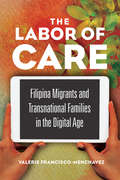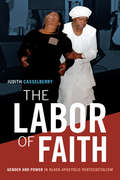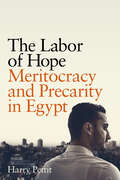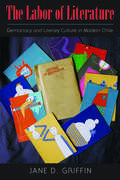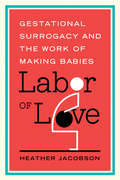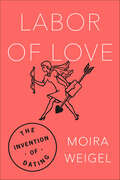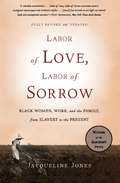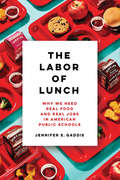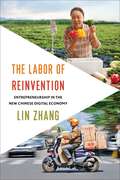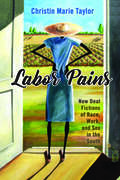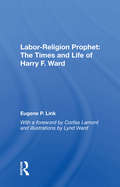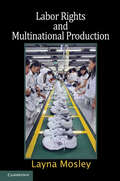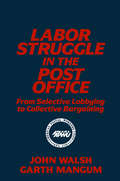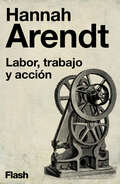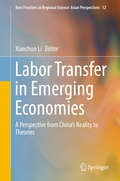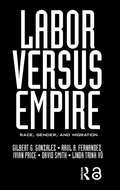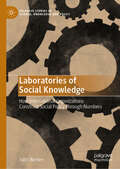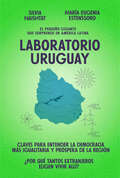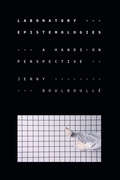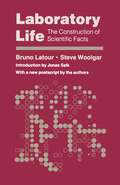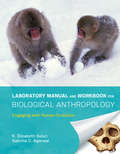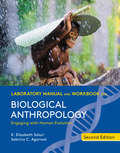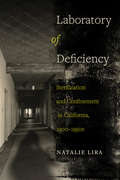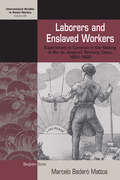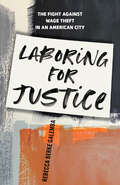- Table View
- List View
The Labor of Care: Filipina Migrants and Transnational Families in the Digital Age (Asian American Experience #124)
by Valerie Francisco-MenchavezFor generations, migration moved in one direction at a time: migrants to host countries, and money to families left behind. <P><P>The Labor of Care argues that globalization has changed all that. Valerie Francisco-Menchavez spent five years alongside a group of working migrant mothers. Drawing on interviews and up-close collaboration with these women, Francisco-Menchavez looks at the sacrifices, emotional and material consequences, and recasting of roles that emerge from family separation. <P>She pays particular attention to how technologies like Facebook, Skype, and recorded video open up transformative ways of bridging distances while still supporting traditional family dynamics. As she shows, migrants also build communities of care in their host countries. <P>These chosen families provide an essential form of mutual support. What emerges is a fascinating portrait of today's transnational family—sundered, yet inexorably linked over the distances by timeless emotions and new forms of intimacy.
The Labor of Faith: Gender and Power in Black Apostolic Pentecostalism
by Judith CasselberryIn The Labor of Faith Judith Casselberry examines the material and spiritual labor of the women of the Church of Our Lord Jesus Christ of the Apostolic Faith, Inc., which is based in Harlem and one of the oldest and largest historically Black Pentecostal denominations in the United States. This male-headed church only functions through the work of the church's women, who, despite making up three-quarters of its adult membership, hold no formal positions of power. Casselberry shows how the women negotiate this contradiction by using their work to produce and claim a spiritual authority that provides them with a particular form of power. She also emphasizes how their work in the church is as significant, labor intensive, and critical to their personhood, family, and community as their careers, home and family work, and community service are. Focusing on the circumstances of producing a holy black female personhood, Casselberry reveals the ways twenty-first-century women's spiritual power operates and resonates with meaning in Pentecostal, female-majority, male-led churches.
The Labor of Hope: Meritocracy and Precarity in Egypt
by Harry PettitTechnological advancements, expanding education, and unfettered capitalism have encouraged many around the world to aspire to better lives, even as declines in employment and widening inequality are pushing more and more people into insecurity and hardship. In Egypt, a generation of young men desire fulfilling employment, meaningful relationships, and secure family life, yet find few paths to achieve this. The Labor of Hope follows these educated but underemployed men as they struggle to establish careers and build satisfying lives. In so doing, this book reveals the lived contradiction at the heart of capitalist systems—the expansive dreams they encourage and the precarious lives they produce. Harry Pettit follows young men as they engage a booming training, recruitment, and entrepreneurship industry that sells the cruel meritocratic promise that a good life is realizable for all. He considers the various ways individuals cultivate distraction and hope for future mobility: education, migration, consumption, and prayer. These hope-filled practices are a form of emotional labor for young men, placing responsibility on the individual rather than structural issues in Egypt's economy. Illuminating this emotional labor, Pettit shows how the capitalist economy continues to capture the attention of the very people harmed by it.
The Labor of Literature: Democracy and Literary Culture in Modern Chile
by Jane D. GriffinBy producing literature in nontraditional forms—books made of cardboard trash, posters in subway stations, miniature shopping bags, digital publications, and even children’s toys—Chileans have made and circulated literary objects in defiance of state censorship and independent of capitalist definitions of value. In The Labor of Literature Jane D. Griffin studies amateur and noncommercial forms of literary production in Chile that originated in response to authoritarian state politics and have gained momentum throughout the postdictatorship period. She argues that such forms advance a model of cultural democracy that differs from and sometimes contradicts the model endorsed by the state and the market. By examining alternative literary publications, Griffin recasts the seventeen-year Pinochet dictatorship as a time of editorial experimentation despite widespread cultural oppression and shows how grassroots cultural activism has challenged government-approved corporate publishing models throughout the postdictatorship period. Griffin’s work also points to the growing importance of autogestión, or do-it-yourself cultural production, where individuals combine artisanal forms with new technologies to make and share creative work on a global scale.
Labor of Love: Gestational Surrogacy and the Work of Making Babies
by Heather JacobsonWhile the practice of surrogacy has existed for millennia, new fertility technologies have allowed women to act as gestational surrogates, carrying children that are not genetically their own. While some women volunteer to act as gestational surrogates for friends or family members, others get paid for performing this service. The first ethnographic study of gestational surrogacy in the United States, Labor of Love examines the conflicted attitudes that emerge when the ostensibly priceless act of bringing a child into the world becomes a paid occupation. Heather Jacobson interviews not only surrogate mothers, but also their family members, the intended parents who employ surrogates, and the various professionals who work to facilitate the process. Seeking to understand how gestational surrogates perceive their vocation, she discovers that many regard surrogacy as a calling, but are reluctant to describe it as a job. In the process, Jacobson dissects the complex set of social attitudes underlying this resistance toward conceiving of pregnancy as a form of employment. Through her extensive field research, Jacobson gives readers a firsthand look at the many challenges faced by gestational surrogates, who deal with complicated medical procedures, delicate work-family balances, and tricky social dynamics. Yet Labor of Love also demonstrates the extent to which advances in reproductive technology are affecting all Americans, changing how we think about maternity, family, and the labor involved in giving birth. For more, visit http://www.heatherjacobsononline.com/
Labor of Love: The Invention of Dating
by Moira Weigel“An occasionally amusing and often provocative look at the work of wooing . . . [A] lively tour of changing romantic mores.” —The Economist“Does anyone date anymore?” Today, the authorities tell us that courtship is in crisis. But when Moira Weigel dives into the history of sex and romance in modern America, she discovers that authorities have always said this. Ever since young men and women started to go out together, older generations have scolded them: That’s not the way to find true love. The first women who made dates with strangers were often arrested for prostitution; long before “hookup culture,” there were “petting parties”; before parents worried about cell phone apps, they fretted about joyrides and “parking.” Dating is always dying. But this does not mean that love is dead. It simply changes with the economy. Dating is, and always has been, tied to work.Lines like “I’ll pick you up at six” made sense at a time when people had jobs that started and ended at fixed hours. But in an age of contract work and flextime, many of us have become sexual freelancers, more likely to text a partner “u still up?” Weaving together over one hundred years of history with scenes from the contemporary landscape, Labor of Love offers a fresh feminist perspective on how we came to date the ways we do. This isn’t a guide to “getting the guy.” There are no ridiculous “rules” to follow. Instead, Weigel helps us understand how looking for love shapes who we are—and hopefully leads us closer to the happy ending that dating promises.
Labor of Love, Labor of Sorrow: Black Women, Work, and the Family, from Slavery to the Present
by Jacqueline JonesThe forces that shaped the institution of slavery in the American South endured, albeit in altered form, long after slavery was abolished. Toiling in sweltering Virginia tobacco factories or in the kitchens of white families in Chicago, black women felt a stultifying combination of racial discrimination and sexual prejudice. And yet, in their efforts to sustain family ties, they shared a common purpose with wives and mothers of all classes. InLabor of Love, Labor of Sorrow, historian Jacqueline Jones offers a powerful account of the changing role of black women, lending a voice to an unsung struggle from the depths of slavery to the ongoing fight for civil rights.
The Labor of Lunch: Why We Need Real Food and Real Jobs in American Public Schools (California Studies in Food and Culture #70)
by Jennifer E. GaddisThere’s a problem with school lunch in America. Big Food companies have largely replaced the nation’s school cooks by supplying cafeterias with cheap, precooked hamburger patties and chicken nuggets chock-full of industrial fillers. Yet it’s no secret that meals cooked from scratch with nutritious, locally sourced ingredients are better for children, workers, and the environment. So why not empower “lunch ladies” to do more than just unbox and reheat factory-made food? And why not organize together to make healthy, ethically sourced, free school lunches a reality for all children? The Labor of Lunch aims to spark a progressive movement that will transform food in American schools, and with it the lives of thousands of low-paid cafeteria workers and the millions of children they feed. By providing a feminist history of the US National School Lunch Program, Jennifer E. Gaddis recasts the humble school lunch as an important and often overlooked form of public care. Through vivid narration and moral heft, The Labor of Lunch offers a stirring call to action and a blueprint for school lunch reforms capable of delivering a healthier, more equitable, caring, and sustainable future.
The Labor of Reinvention: Entrepreneurship in the New Chinese Digital Economy
by Lin ZhangFrom start-up founders in the Chinese equivalent of Silicon Valley to rural villages experiencing an e-commerce boom to middle-class women reselling luxury goods, the rise of internet-based entrepreneurship has affected every part of China. For many, reinventing oneself as an entrepreneur has appeared to be an appealing way to adapt to a changing economy and society. Yet in practice, digital entrepreneurship has also reinforced traditional Chinese ideas about state power, labor, gender, and identity.Lin Zhang explores how the everyday labor of entrepreneurial reinvention is remaking China amid changing geopolitical currents. She tells the stories of people from diverse class, gender, and age backgrounds across rural, urban, and transnational settings in rich detail, providing a multifaceted and ground-level view of the twenty-first-century Chinese economy. Zhang explores the surge in digital entrepreneurialism against the backdrop of global financial crises, the U.S.-China trade war, and the COVID-19 pandemic. She argues that the rise of internet-based industries and practices has simultaneously empowered and exploited digital entrepreneurs and laborers. Despite embracing high-tech innovation, state-led entrepreneurialization does not represent a radical break with the past. It has provided a means for implementing developmental goals while retaining the importance of the traditional family and generating new inequalities.Shedding new light on global capitalism and the digital economy by centering a non-Western perspective, The Labor of Reinvention vividly conveys how the contradictions of entrepreneurialism have played out in China.
Labor Pains: New Deal Fictions of Race, Work, and Sex in the South (Margaret Walker Alexander Series in African American Studies)
by Christin Marie TaylorFrom the 1930s to the 1960s, the Popular Front produced a significant era in African American literary radicalism. While scholars have long associated the black radicalism of the Popular Front with the literary Left and the working class, Christin Marie Taylor considers how black radicalism influenced southern fiction about black workers, offering a new view of work and labor.At the height of the New Deal era and its legacies, Taylor examines how southern literature of the Popular Front not only addressed the familiar stakes of race and labor but also called upon an imagined black folk to explore questions of feeling and desire. By poring over tropes of black workers across genres of southern literature in the works of George Wylie Henderson, William Attaway, Eudora Welty, and Sarah Elizabeth Wright, Taylor reveals the broad reach of black radicalism into experiments with portraying human feelings.These writers grounded interrelationships and stoked emotions to present the social issues of their times in deeply human terms. Taylor emphasizes the multidimensional use of the sensual and the sexual, which many protest writers of the period, such as Richard Wright, avoided. She suggests Henderson and company used feeling to touch readers while also questioning and reimagining the political contexts and apparent victories of their times. Taylor shows how these fictions adopted the aesthetics and politics of feeling as a response to New Deal–era policy reforms, both in their successes and their failures. In effect, these writers, some who are not considered a part of an African American protest tradition, illuminated an alternative form of protest through poignant paradigms.
Labor-religion Prophet: The Times And Life Of Harry F. Ward
by Eugene P LinkAs first national chairman of the American Civil Liberties Union, the first professor of Christian ethics at both Boston University and Union Theological Seminary, and a pioneer of dialogs between religion and Marxism, Harry F. Ward led a life marked with many milestones. An advocate of the working-class and the underprivileged, Ward avoided the do
Labor Rights and Multinational Production
by Layna MosleyLabor Rights and Multinational Production investigates the relationship between workers' rights and multinational production. Mosley argues that some types of multinational production, embodied in directly owned foreign investment, positively affect labor rights. But other types of international production, particularly subcontracting, can engender competitive races to the bottom in labor rights. To test these claims, Mosley presents newly generated measures of collective labor rights, covering a wide range of low- and middle-income nations for the 1985–2002 period. Labor Rights and Multinational Production suggests that the consequences of economic openness for developing countries are highly dependent on foreign firms' modes of entry and, more generally, on the precise way in which each developing country engages the global economy. The book contributes to academic literature in comparative and international political economy, and to public policy debates regarding the effects of globalization.
Labor Struggle in the Post Office: From Selective Lobbying to Collective Bargaining (Labor And Human Resources)
by John Walsh Garth L. MangumUsing data from the 2000 Census, this collection examines the major demographic and employment trends in the rural Midwestern states with special attention to the issues that state and local policy makers must address in the near future.
Labor, trabajo y acción
by Hannah ArendtFlash publica uno de los textos más representativos del pensamiento de Hannah Arendt. Un ensayo que reinterpreta los conceptos de labor, trabajo y acción en su relación con el ser humano a lo largo de la historia de la humanidad. «Es el momento de aprovechar esta oportunidad para pensar en lo que es un trabajo valioso de verdad». Enrique Zamorano, El Confidencial En este texto, recogido en La pluralidad del mundo, Hannah Arendt reflexiona sobre el significado del trabajo y su relación con el ser humano a lo largo del tiempo. La filósofa toma como base el concepto de vida activa y cómo en esta se desarrollan los tres medios (labor, trabajo y acción) con los que alcanzar el «ideal» al que los griegos aspiraban desde la era pre-filosófica: una vida contemplativa, aquella que les podría otorgar calma, paz interior y claridad de pensamiento. No obstante, Arendt da un paso más allá y trata de desmontar esa jerarquía donde prevaleció durante siglos la contemplación y la calma. ¿Y si la vida activa fuera inherente al ser humano? ¿Y si estamos predestinados a la actividad para mantenernos vivos? ¿No deberíamos resignificar nuestros valores? Con estas preguntas, Arendt examina los tres conceptos que ponen en el centro al ser humano y su relación con el entorno: la labor, como una actividad rutinaria y necesaria para la supervivencia del individuo; el trabajo, como el esfuerzo que produce un mundo con objetos sólidos y perdurables, que sobreviven a la finitud de los organismos vivos; la acción, intrínseca a los seres humanos desde que nacemos, porque estamos condenados a relacionarnos y nuestros actos tienen causas y consecuencias infinitas. A través del estudio y la separación de estas tres ideas, Arendt pone en valor la vida activa para comprender que no se puede prescindir de ella en pro de la contemplación, puesto que reivindicar la labor, el trabajo y la acción es reivindicar nuestra propia libertad como individuos en el mundo. Sobre La pluralidad del mundo: «Hoy, como entonces, el vocabulario que empleó Arendt para pensar y narrar el mundo, sus reflexiones y esa escritura tan bella, tan suya, nos ayudan a interpretar lo que nos ocurre, aunque solo sea como simples enanos mirando el mundo a hombros de gigantes. Ella, desde luego, lo fue.»Máriam Martínez-Bascuñán, Babelia, El País «Hannah Arendt volvió a pensar el espacio público después de su destrucción y nosotros debemos volver a ella para prevenir que se destruya de nuevo.»Andreu Jaume «Judía y alemana, Hannah Arendt reflexiona sobre la ascensión del nazismo y la ceguera de no haber visto a tiempo su peligro.»César Antonio Molina, ABC Sobre La libertad de ser libres: «Este ensayo recién redescubierto es como una petición de compromiso político en la era de Trump.»Die Zeit «Pese a haber sido escrito hace cincuenta años, es tan moderno que parece pensado para la actualidad política mundial.»Westdeutscher Rundfunk «Un ensayo inspirador de una relevancia extraordinaria, especialmente en tiempos en que se cuestionan los valores liberales del orden democrático.»Philosophie Sobre Eichmann en Jerusalén: «Es historia, es pensamiento y es advertencia -aún hoy- sobre las consecuencias de la banalidad del mal, de la que a pesar de lo vivido, no estamos vacunados.»Laura Barrachina, RNE «Un ensayo imprescindible. Arendt no se olvida de nadie.»Marta Michel, El Mundo - Yo Dona «En vez de defender la causa de su pueblo de manera incondicional, Arendt se puso a reflexionar, investigar y debatir. En palabras de Aristóte
Labor Transfer in Emerging Economies
by Xiaochun LiBased on new phenomena appearing in many emerging economies, this book presents a theoretical study on the economic influences of labor transfer from several aspects. In recent years, thanks to the continuous progress of social forms as well as science and technology, there are a large number of new developing trends in emerging nations. Taking China as an example, several economic issues have sprung up with the huge scale of labor transfer, such as development of modern agriculture, environmental protection, privatization of mixed enterprises, training of human capital, and migrant workers' remittances to their hometowns. However, the existing researches on labor transfer pay little attention to them. In order to bridge the gap, this book combines new economic data with basic theories of labor migration, and discusses economic influences of labor transfer in four angles: human capital, migrants' remittances, environmental protection, and development of modern agriculture. Each part is composed of two or three analytical elements. Our conclusions not only enrich existing theoretical researches, but also provide theoretical support for related national economic policies.
Labor Versus Empire: Race, Gender, Migration
by Gilbert G. Gonzalez Raul A. Fernandez Vivian Price David Smith Linda Trinh VõThe essays in this collection address issues significant to labor within regional, national and international contexts. Themes of the chapters will focus on managed labor migration; organizing in multi-ethnic and multi-national contexts; global economics and labor; global economics and inequality; gender and labor; racism and globalization; regional trade agreements and labor.
Laboratories of Social Knowledge: How International Organizations Construct Social Policy Through Numbers (Palgrave Studies in Science, Knowledge and Policy)
by John BertenThe book examines the politics of knowledge in global social policy, investigating how international organisations (IOs) have contributed to the emergence and development of social security as a global policy field. It reconstructs the role of numerical knowledge in the International Labour Organization (ILO) and the World Bank, theorising how IOs contribute to epistemic infrastructures of global social security. The book shows how IOs&’ knowledge production has led to a continuous refinement of the meaning and purpose of social security. First, it reveals how IOs arrived at a shared conception of social security: what the book calls an ontological framework. Second, it traces how numbers have increasingly enabled the assessment of countries according to shared benchmarks: what the book calls an evaluative framework. The author demonstrates the political and epistemic work involved in universalising knowledge of social security, while highlighting the limits of governing by numbers in global social policy.
Laboratorio Uruguay: El pequeño gigante que sorprende en América Latina
by María Eugenia Estenssoro Silvia NaishtatUn recorrido fascinante por el laboratorio político, económico, social y cultural más exitoso y sugestivo del momento: Uruguay, ese edén sudamericano que se abre camino con mesura en medio de una región convulsionada. A partir de 2020, la Argentina comenzó a asistir a un fenómeno inédito: la emigración a Uruguay de un creciente número de destacados emprendedores tecnológicos, profesionales con excelentes empleos y dueños de poderosos grupos económicos. Ya no se trataba de perseguidos políticos o de desempleados, como había ocurrido en épocas anteriores, sino de personas que, por su solvencia financiera y su experiencia empresarial, movían la economía generando innovación, trabajo y riqueza. ¿Por qué, pudiendo vivir en Nueva York, Londres, París o Tel Aviv, ellos elegían Punta del Este, José Ignacio, Montevideo y hasta Colonia del Sacramento? Silvia Naishtat y María Eugenia Estenssoro se propusieron dilucidar las claves detrás de la novedosa elección de vida de muchos argentinos (y la fantasía de otros) y el resultado es un libro revelador. Con abundante información y el testimonio de sus protagonistas -desde Julio Bocca a "los Messi" del campo y los unicornios tecnológicos-, como también de notables personalidades de la política uruguaya, logran contagiar su admiración por "el pequeño gigante latinoamericano", sin imaginar por ello un destino contrapuesto para la Argentina: "No creemos en las antinomias, ellos y nosotros -dicen-. Más bien, pretendemos derribar fronteras y barreras para aprovechar nuestra potencia cuando creamos, trabajamos y mateamos juntos".
Laboratory Epistemologies: A Hands-On Perspective (Experimental Futures)
by Jenny BoulboulléIn Laboratory Epistemologies: A Hands-On Perspective, Jenny Boulboullé examines the significance of hands-on experiences in contemporary life sciences laboratories. Addressing the relationship between contemplation and manipulation in epistemology, Boulboullé combines participant observations in molecular genetics labs and microbiological cleanrooms with a longue durée study of the history and philosophy of science. She radically rereads Descartes’s key epistemological text Meditations on First Philosophy, reframing the philosopher as a hands-on knowledge maker. With this reading, Boulboullé subverts the pervasive modern conception of the disembodied knower and puts the hands-on experimenter at the heart of life sciences research. In so doing, she contributes a theoretical model for understanding how life processes on cellular and molecular levels are manually produced in today’s techno-scientific spaces. By reassessing the Cartesian legacy and arguing that epistemology should be grounded in the standpoint of a hands-on practitioner, Boulboullé offers the philosophical and historical foundation to understand and study contemporary life sciences research as multisensory embodied practices.
Laboratory Life: The Construction of Scientific Facts
by Bruno Latour Steve WoolgarThis highly original work presents laboratory science in a deliberately skeptical way: as an anthropological approach to the culture of the scientist. Drawing on recent work in literary criticism, the authors study how the social world of the laboratory produces papers and other "texts,"' and how the scientific vision of reality becomes that set of statements considered, for the time being, too expensive to change. The book is based on field work done by Bruno Latour in Roger Guillemin's laboratory at the Salk Institute and provides an important link between the sociology of modern sciences and laboratory studies in the history of science.
Laboratory Manual and Workbook for Biological Anthropology
by K. Elizabeth Soluri Sabrina C. AgarwalThe perfect lab solution. A vividly illustrated, flexible, and topically balanced manual with a critical-thinking approach
Laboratory Manual and Workbook for Biological Anthropology (Second Edition): Engaging With Human Evolution
by K. Elizabeth Soluri Sabrina C. AgarwalThe most popular and affordable manual, now more hands-on than ever! The #1 manual for biological anthropology, Soluri/Agarwal has become even more visual and hands-on in its Second Edition. Whether used standalone or packaged with a Norton textbook, Soluri/Agarwal is the most affordable manual for students. This purchase offers access to the digital ebook only.
Laboratory of Deficiency: Sterilization and Confinement in California, 1900–1950s (Reproductive Justice: A New Vision for the 21st Century #6)
by Natalie LiraPacific Colony, a Southern California institution established to care for the "feebleminded," justified the incarceration, sterilization, and forced mutilation of some of the most vulnerable members of society from the 1920s through the 1950s. Institutional records document the convergence of ableism and racism in Pacific Colony. Analyzing a vast archive, Natalie Lira reveals how political concerns over Mexican immigration—particularly ideas about the low intelligence, deviant sexuality, and inherent criminality of the "Mexican race"—shaped decisions regarding the treatment and reproductive future of Mexican-origin patients. Laboratory of Deficiency documents the ways Mexican-origin people sought out creative resistance to institutional control and offers insight into how race, disability, and social deviance have been called upon to justify the confinement and reproductive constraint of certain individuals in the name of public health and progress.
Laborers and Enslaved Workers: Experiences in Common in the Making of Rio de Janeiro's Working Class, 1850-1920
by Marcelo Badaró MattosFrom the middle of the nineteenth century until the 1888 abolition of slavery in Brazil, Rio de Janeiro was home to the largest urban population of enslaved workers anywhere in the Americas. It was also the site of an incipient working-class consciousness that expressed itself across seemingly distinct social categories. In this volume, Marcelo Badaró Mattos demonstrates that these two historical phenomena cannot be understood in isolation. Drawing on a wide range of historical sources, Badaró Mattos reveals the diverse labor arrangements and associative life of Rio's working class, from which emerged the many strategies that workers both free and unfree pursued in their struggles against oppression.
Laboring for Justice: The Fight Against Wage Theft in an American City
by Rebecca Berke GalembaLaboring for Justice highlights the experiences of day laborers and advocates in the struggle against wage theft in Denver, Colorado. Drawing on more than seven years of research that earned special recognition for its community engagement, this book analyzes the widespread problem of wage theft and its disproportionate impact on low-wage immigrant workers. Rebecca Galemba focuses on the plight of day laborers in Denver, Colorado—a quintessential purple state that has swung between some of the harshest and more welcoming policies around immigrant and labor rights. With collaborators and community partners, Galemba reveals how labor abuses like wage theft persist, and how advocates, attorneys, and workers struggle to redress and prevent those abuses using proactive policy, legal challenges, and direct action tactics. As more and more industries move away from secure, permanent employment and towards casualized labor practices, this book shines a light on wage theft as symptomatic of larger, systemic issues throughout the U.S. economy, and illustrates how workers can deploy effective strategies to endure and improve their position in the world amidst precarity through everyday forms of convivencia and resistance. Applying a public anthropology approach that integrates the experiences of community partners, students, policy makers, and activists in the production of research, this book uses the pressing issue of wage theft to offer a methodologically rigorous, community-engaged, and pedagogically innovative approach to the study of immigration, labor, inequality, and social justice.
